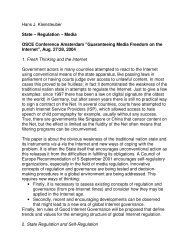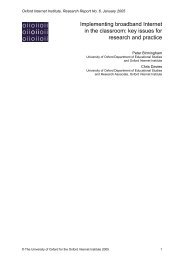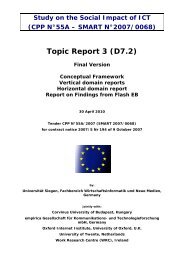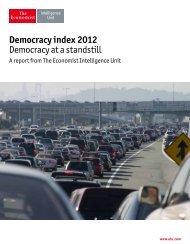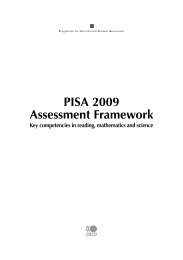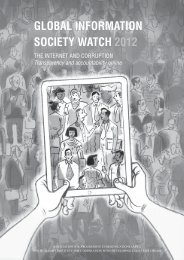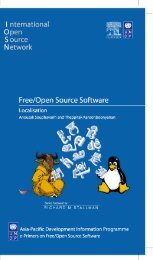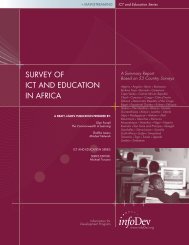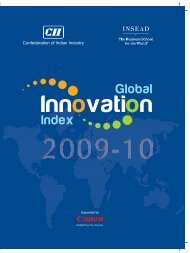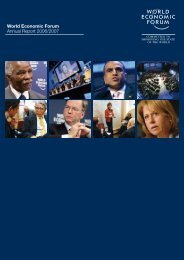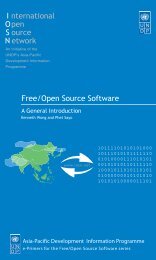J U N E 2 0 1 1<strong>Internet</strong> <strong>Freedom</strong>A <strong>Foreign</strong> <strong>Policy</strong> <strong>Imperative</strong> <strong>in</strong> <strong>the</strong> <strong>Digital</strong> <strong>Age</strong>14 |III. <strong>Internet</strong> <strong>Freedom</strong>and Political ChangeThe <strong>Internet</strong>’s potential as a tool for politicalchange captivated top foreign policy officials<strong>in</strong> 2009 dur<strong>in</strong>g what was quickly dubbed Iran’sTwitter Revolution. The new awareness grew asprotestors used <strong>the</strong> <strong>Internet</strong> and text messages tospread <strong>in</strong>formation and coord<strong>in</strong>ate efforts, andwas crystallized by <strong>the</strong> viral movement of a videodepict<strong>in</strong>g <strong>the</strong> brutal slay<strong>in</strong>g of a young Iranianstudent, Neda Agha-Soltan. The video, whichwas captured on a mobile phone and uploadedto YouTube, traveled across <strong>the</strong> Web and ontolocal and satellite television, prompt<strong>in</strong>g Obamato express his outrage at <strong>the</strong> kill<strong>in</strong>g. When <strong>the</strong>president of <strong>the</strong> United States uses a White Housepress conference to address material uploaded toYouTube, someth<strong>in</strong>g fundamental has changed <strong>in</strong><strong>the</strong> nature of modern communications.The focus on <strong>Internet</strong> freedom grew as <strong>the</strong> ArabSpr<strong>in</strong>g ga<strong>the</strong>red momentum a year and a half later.The wave of revolts across <strong>the</strong> Arab world, beg<strong>in</strong>n<strong>in</strong>g<strong>in</strong> Tunisia, <strong>the</strong>n sweep<strong>in</strong>g across Egypt and<strong>in</strong>to Libya, Bahra<strong>in</strong>, Yemen, Syria and elsewherewere fueled <strong>in</strong> part by activists us<strong>in</strong>g tools such asFacebook, Twitter, SMS (text messag<strong>in</strong>g) and o<strong>the</strong>rplatforms. Several regimes took draconian steps tostop onl<strong>in</strong>e organiz<strong>in</strong>g and communication. Thesense grew that <strong>the</strong> <strong>Internet</strong> mattered, but just howit mattered was not totally clear.In a sense, <strong>the</strong> <strong>Internet</strong> represents just <strong>the</strong> latestpart of a story that has unfolded for centuries.Communication technologies have played significantroles <strong>in</strong> political movements s<strong>in</strong>ce antiquity,from <strong>the</strong> pr<strong>in</strong>t<strong>in</strong>g press that empowered <strong>the</strong>Reformation, cassette tapes distributed by Iranianrevolutionaries <strong>in</strong> 1979, to fax mach<strong>in</strong>es used byPoland’s Solidarity movement and satellite televisiontoday. But <strong>the</strong> global nature of <strong>the</strong> <strong>Internet</strong>,its very low barrier to entry, its speed and <strong>the</strong>degree to which it empowers <strong>the</strong> <strong>in</strong>dividual allmake it qualitatively different from earlier technologies.The <strong>Internet</strong> itself has become <strong>the</strong> focusof attention by dictators, democracy activists andobservers around <strong>the</strong> world.Does <strong>Internet</strong> <strong>Freedom</strong> Lead to Democracy?The United States promotes <strong>Internet</strong> freedombecause Americans believe <strong>in</strong> <strong>the</strong> freedom ofexpression, <strong>in</strong> any medium. The country alsopromotes it because American leaders have betthat, on balance, <strong>the</strong> <strong>in</strong>creased availability of new,unfettered communications technologies abets <strong>the</strong>spread of democracy. But does it?Here we use <strong>the</strong> term “democracy” to mean a politicalsystem that is transparent and accountable to<strong>the</strong> public through free and fair elections; <strong>in</strong>cludesactive political participation by <strong>the</strong> citizenry;protects human rights; and ma<strong>in</strong>ta<strong>in</strong>s a rule oflaw that is fair to all citizens. 25 This is obviously anideal, and democratic systems exhibit many variations,but this def<strong>in</strong>ition offers a useful standardfor measur<strong>in</strong>g potential progress.Experts rema<strong>in</strong> deeply divided, as shown <strong>in</strong> <strong>the</strong>text box on <strong>the</strong> follow<strong>in</strong>g page, as to whe<strong>the</strong>runbridled access to <strong>the</strong> <strong>Internet</strong> can help transformauthoritarian regimes over time and br<strong>in</strong>g greaterfreedom to once-closed societies. Most attemptsto assess its impact rely on case studies, anecdotesor <strong>the</strong>ory. The novelty of <strong>the</strong> phenomenon and <strong>the</strong>few and widely vary<strong>in</strong>g data po<strong>in</strong>ts pose notableanalytical challenges, and assessments requirea certa<strong>in</strong> amount of subjective <strong>in</strong>terpretation.Facebook clearly played a major role <strong>in</strong> build<strong>in</strong>g anopposition to <strong>the</strong> Hosni Mubarak regime <strong>in</strong> Egyptand <strong>in</strong> organiz<strong>in</strong>g protests. But after <strong>the</strong> governmentshut off <strong>the</strong> <strong>Internet</strong>, protests became bigger,not smaller. So did this demonstrate <strong>the</strong> <strong>Internet</strong>’slimited role as a tool of agitation? Or did <strong>the</strong>shutoff of cherished onl<strong>in</strong>e tools itself spur enragedcitizens to demonstrate <strong>in</strong>stead of stay<strong>in</strong>g home(possibly <strong>in</strong> front of a computer)?
Does <strong>the</strong> <strong>Internet</strong> Promote Democracy?Optimists“The <strong>Internet</strong> is above all <strong>the</strong> most fantastic means ofbreak<strong>in</strong>g down <strong>the</strong> walls that close us off from oneano<strong>the</strong>r. For <strong>the</strong> oppressed peoples of <strong>the</strong> world,<strong>the</strong> <strong>Internet</strong> provides power beyond <strong>the</strong>ir wildesthopes.” 26Bernard KouchnerFormer French <strong>Foreign</strong> M<strong>in</strong>ister“It does make a difference when people <strong>in</strong>side closedregimes get access to <strong>in</strong>formation – which is whydictatorships make such efforts to block comprehensive<strong>Internet</strong> access … [promot<strong>in</strong>g <strong>Internet</strong> freedom]would be a cheap and effective way of stand<strong>in</strong>g withIranians while chipp<strong>in</strong>g away at <strong>the</strong> 21st-century wallsof dictatorship.” 27Nicholas KristofThe New York Times columnist“The <strong>Internet</strong> is possibly one of <strong>the</strong> greatest tools fordemocratization and <strong>in</strong>dividual freedom that we’veever seen.” 28Condoleezza RiceFormer Secretary of State“Without Twitter, <strong>the</strong> people of Iran would not havefelt empowered and confident to stand up for freedomand democracy.” 29Mark PfeifleFormer Deputy National Security Advisor“If you want to liberate a society, just give <strong>the</strong>m <strong>the</strong><strong>Internet</strong>.” 30Wael GhonimEgyptian Google Executiveand democracy activistSkeptics“The idea that <strong>the</strong> <strong>Internet</strong> favors <strong>the</strong> oppressedra<strong>the</strong>r than <strong>the</strong> oppressor is marred by what I callcyber-utopianism: a naïve belief <strong>in</strong> <strong>the</strong> emancipatorynature of onl<strong>in</strong>e communication that rests on a stubbornrefusal to admit its downside.” 31Evgeny MorozovAuthor of The Net Delusion“The platforms of social media are built around weakties … weak ties seldom lead to high-risk activism.” 32Malcolm GladwellThe New Yorker staff writer“Democracy isn’t just a tweet away.” 33Jeffrey Gedm<strong>in</strong>Former President of Radio Free Europe/Radio Liberty“It is time to get Twitter’s role <strong>in</strong> <strong>the</strong> events <strong>in</strong> Iranright. Simply put: There was no Twitter Revolution<strong>in</strong>side Iran.” 34Golnaz EsfandiariSenior Correspondent for Radio Free Europe/Radio Liberty“Techno-optimists appear to ignore <strong>the</strong> fact that<strong>the</strong>se tools are value neutral; <strong>the</strong>re is noth<strong>in</strong>g <strong>in</strong>herentlypro-democratic about <strong>the</strong>m. To use <strong>the</strong>m is toexercise a form of freedom, but it is not necessarily afreedom that promotes <strong>the</strong> freedom of o<strong>the</strong>rs.” 35Ian BremmerPresident of <strong>the</strong> Eurasia GroupIt has become axiomatic to say that <strong>the</strong> <strong>Internet</strong> doesnot itself create democracies or overthrow regimes;people do. This is obviously true, but if new communicationstools do matter – and <strong>the</strong>re appears to be atleast nascent evidence that <strong>the</strong>y do – <strong>the</strong>n <strong>the</strong>y can playa role <strong>in</strong> several dist<strong>in</strong>ct ways. An important reportissued by <strong>the</strong> United States Institute of Peace (USIP)presented a useful framework for exam<strong>in</strong><strong>in</strong>g how newcommunications technologies might affect politicalaction. The paper identifies five dist<strong>in</strong>ct mechanismsthrough which <strong>the</strong> <strong>Internet</strong> might promote (or be usedby regimes to block) democratic progress. 36 Here wedeepen <strong>the</strong> analysis of <strong>the</strong>se mechanisms and add twoadditional factors that affect <strong>the</strong>m.| 15



